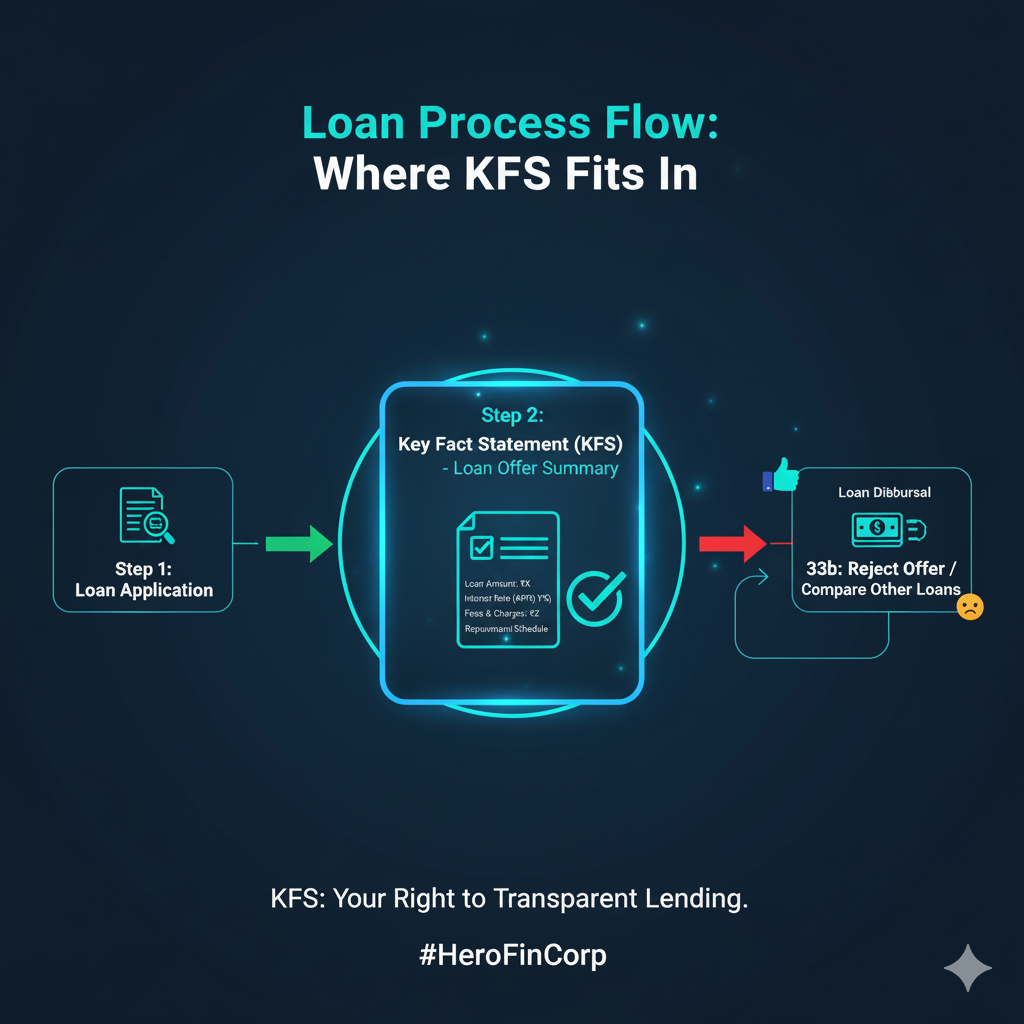Key Fact Statement: Meaning, Full Form, and Importance

Your Key Fact Statement (KFS) is a mandatory statement that gives you a clear, transparent summary of your loan’s T&Cs. Just like you review a contract before signing it, understanding your KFS empowers you to make informed borrowing decisions before you sign any loan agreements.
Let’s dive deeper into this concept.
What is a Key Fact Statement (KFS)?
The KFS is a standardised document that summarises your loan’s most critical terms and conditions in an easy-to-understand format. Your lender must provide you with this document to serve as a legal tool for your protection.

KFS eliminates any confusion or future ambiguity about the interest rates, fees, and repayment obligations that you are held to for the loan term. In short, it gives you a comprehensible, complete picture of your loan and associated T&C.
Why is a Key Fact Statement Important for Loan Borrowers?
The KFS acts as your ultimate financial shield by ensuring complete transparency. It provides details for every charge and fee associated with your loan so that there are no hidden surprises. Additionally, the KFS has a standardised format, allowing you to easily compare loan T&Cs across lenders and select the best option for your needs.
Your KFS also educates you about the legal rights, prepayment, and foreclosure terms to prevent future disputes and build a strong foundation of trust.
What are the Key Components of KFS?
There are several non-negotiable key fact statement components designed to give you the big picture of your loan. Some crucial KFS details are -
• The exact loan amount that you will receive
• The effective rate of interest applied to your loan
• A detailed breakdown of all processing fees, documentation charges, and miscellaneous expenses charged to you
• A clear timeline of your EMIs
• The final amount you will be paying back (principal + interest)
• The repayment and foreclosure charges applicable if you close early, and their T&C
• The duration for which the loan offer is valid
RBI Guidelines and Updates on Key Fact Statement
To protect consumers, the RBI mandates that lenders must standardise loan disclosures by providing KFS as of April 2024.

RBI's KFS guidelines direct that for all retail and MSME loans, the lenders should provide KFS to borrowers. One of the critical aspects of key fact statement RBI updates is the transparent display of APR (Annual Percentage Rate), which represents the actual cost of loan to the borrower.
These guidelines aim to ensure that lenders remain clear and transparent in their offers and that consumers have a safeguard against exploitation by banks and NBFCs. KFS RBI rules mandate lenders to present complex financial information in a clearly understandable, simple format, empowering borrowers to make prudent decisions.
How to Access and Use Your Key Fact Statement
Accessing key fact statement access in India is simple and a compulsory part of your digital loan journey. Lenders are mandated by law to provide a KFS to you before your loan is sanctioned/disbursed.
Modern lending processes make it easy for you to access your KFS. It is either shared with you as a secure PDF by the lender via email or presented to you on-screen via the lending app. You can use this KFS to verify the interest rate, ensure all fees are accounted for, and understand the terms of payment before you sign the loan.
Borrow Right, Stay Informed!
Don’t view KFS as another piece of paperwork to get a loan. It is your contract summary that guarantees transparency and prevents unexpected financial twists and turns.
Reliable lenders like Hero FinCorp offer instant personal loans with a detailed view of your KFS on your mobile phone. Check your eligibility instantly with Hero FinCorp today and manage your finances stress-free!
Frequently Asked Questions
1. What does KFS stand for, and why is it important?
KFS is short for Key Fact Statement. It summarises the important T&C of your loan, and is a legally mandated document.
2. Is KFS mandatory for all types of loans?
Yes, it is mandatory for all retail loans, covering both secured and unsecured loans.
3. How long is a KFS valid for?
The lender defines the KFS validity period. After the validity period is over, the loan's terms and conditions may change or expire.
4. Can fees and charges in KFS be changed after loan approval?
No, the KFS contains the final loan offer with all associated T&C, which cannot be changed once you accept the loan offer.
5. What should I do if my lender does not provide the KFS?
If your lender doesn't provide the KFS, contact your lender's customer service, stating that you have not received the KFS and are requesting it immediately, referencing the RBI guidelines. You can also escalate the issue to the RBI Ombudsman if the problem is not resolved.